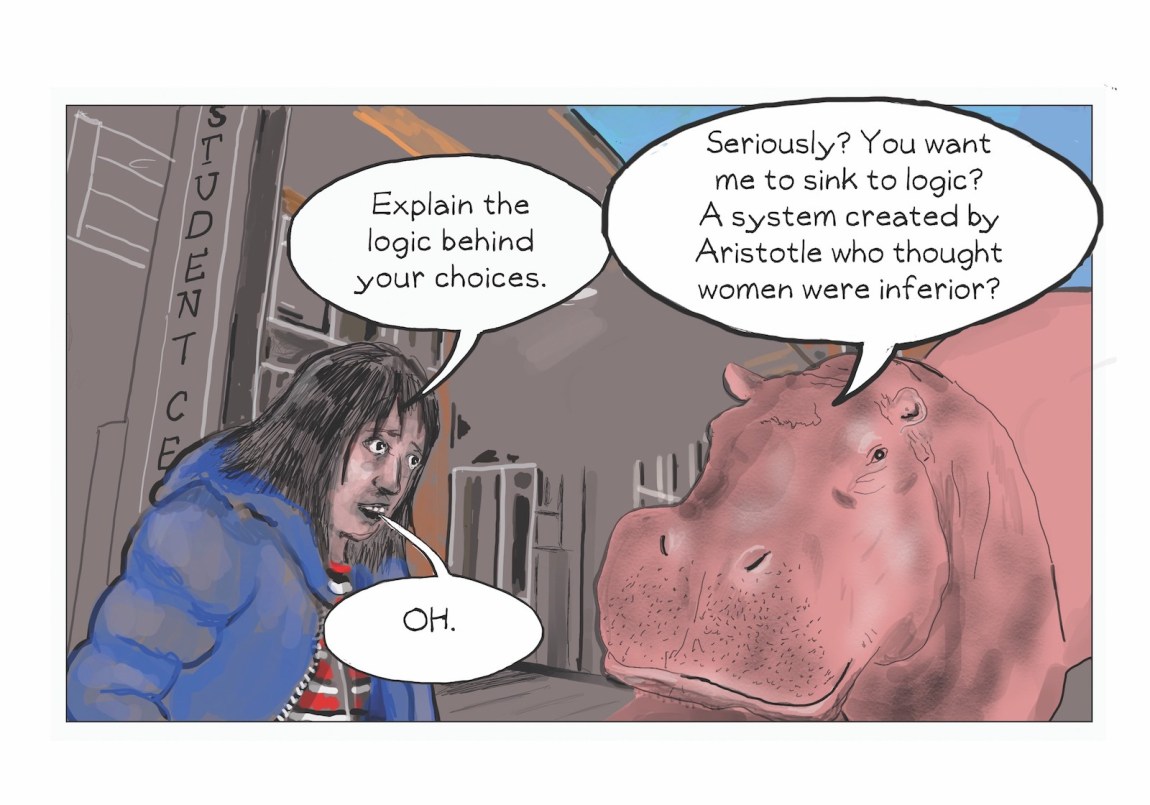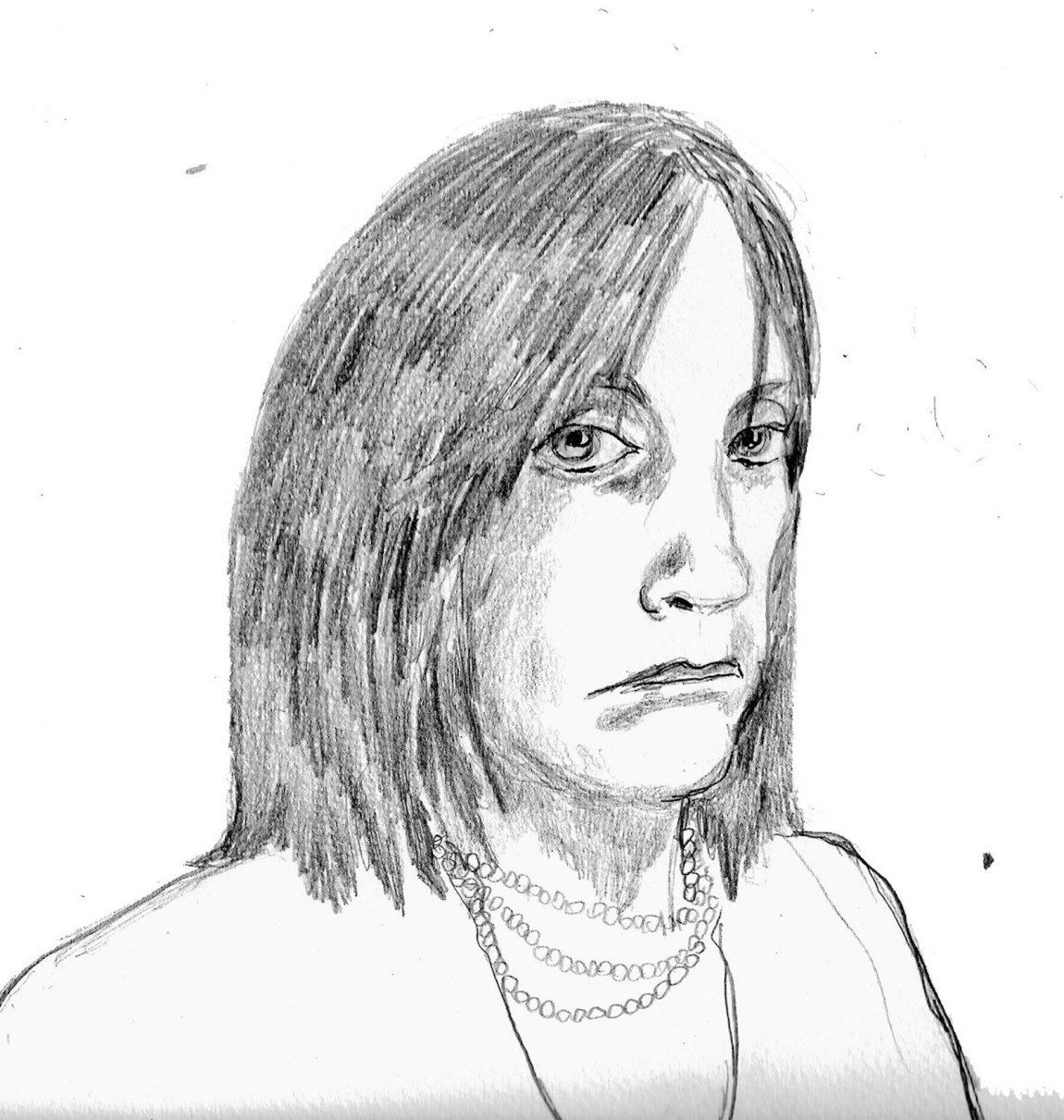Merrill Markoe, the artist, writer, and comedian who co-created Late Night with David Letterman, has recently published her tenth book, a graphic novel based on her childhood diaries. We Saw Scenery, which Markoe both wrote and illustrated, is a snappy and revealing look at Markoe’s journey from her days as a pre-teen Girl Scout in North Miami in the late 1950s to her audacious entry into West Coast hippiedom. Along the way, there are family car trips, early crushes, casual blows to her ego that create lifelong repercussions, and TV. Markoe had her first experience of television-writing in 1958, at age ten, when The Jim Dooley Show read a smart-assed letter she had sent in. She worked at Letterman from 1982 to 1988, then went on to host her own news segment on a local LA channel. Los Angeles magazine called her the “weirdest, most disturbing lifestyle reporter to hit the tube in some time.”
In We Saw Scenery, Markoe, now seventy-two, revisits her younger diary entries, wondering whether the “original-recipe version” of herself in grade school resembles “the geezer version of me who had become a writer…Was I always her?” She illustrates the brain itself—specifically, the hippocampus, which she draws as a recurring hippo character—and argues with the hippo, especially the (irresponsible, random-seeming) quality of memories it preserved:
MARKOE (TO HIPPOCAMPUS): Explain the logic behind your choices.
HIPPOCAMPUS: Seriously? You want me to sink to logic? A system created by Aristotle, who thought women were inferior?
MARKOE: Oh.
There are pains from childhood: her father’s bankruptcy; a humiliating doctor’s appointment that contributed to her lifelong diet issues; a boy she had a crush on offering her a Nazi salute (Markoe is Jewish). She relates these personal horrors with breezy levity, and struggles against her mother’s constant disapproval to become a free-spirited teenager (who even participated in the Electric Kool-Aid Acid Test, Ken Kesey’s “happening” on which Tom Wolfe’s book of the same name is based).
Before she became a TV writer, Markoe taught art at the University of Southern California. Her drawings in We Saw Scenery recall the works of cartoonist Lynda Barry: faces are full of mood; bodies are wonky with the awkwardness of growing. The fashions of the time, being of almost existential importance to the younger Markoe, are gleefully represented.
On camera, Markoe is a polished, unconventional knockout—a self-effacing, calls-it-as-she-sees-it Rosalind Russell type, given to wry remarks and world-class punchlines. Despite winning four Emmy Awards at Letterman, much of her subsequent output was never broadcast. (A topical show she co-wrote and directed with Harry Shearer for HBO in 1987 called This Week Indoors didn’t get made, even though the then head of NBC Brandon Tartikoff called the pilot “SNL for Mensa members.” News2Us with Richard Rosen for HBO, and Lewis Lectures for Adult Swim, suffered the same fate. Fortunately, many of these projects have been uploaded to Markoe’s YouTube page.)
I’ve admired Markoe for decades—her refusal to compromise when it comes to material, her unapologetic intelligence, the way she presents herself as a woman (chic and desirable without resorting to crass sex appeal) and her ride-or-die, knuckle-dusting verve when it comes to delivering the joke. She and I corresponded via e-mail; the following is an edited, condensed version of our dialogue.
Cintra Wilson: You are most famous for being an acclaimed TV writer.
Merrill Markoe: I became aware a few years ago that the word “legend” was suddenly being hurled at me. At first, I didn’t know what to make of it or why it was happening. Then I realized that what they meant when they said that was that they thought I was dead.
You’ve had quite a few TV projects that made it to the pilot stage but not beyond. What’s your coping philosophy for these frustrating events? Especially when you’re really clear on the value of the projects?
I think what may be true is I’m just not a mainstream kind of guy.
I was pretty happy with all three of those [pilots]. Therefore, when they tanked, I learned nothing. That’s my coping strategy: twenty-five years later, I am still looking at these things and realizing I didn’t succeed more than I did because I still don’t know what is wrong with them.
That I couldn’t break through with them…well, for whatever reason, that seems to be the story of my life. I have to conclude it’s me. I am just too weird for the room.
As you move on in life, you start to realize that at least if you liked the content and tried as hard as you could to put it across, that is the only reward you can count on.
Advertisement
Do you believe that sexism played a part in your not having a more mainstream career?
I think a lot of my efforts were side-tracked by sexism, but I can’t prove it because it took place behind closed doors. It’s hard to know where the patriarchy strikes.
[What TV executives] liked best at the time was for funny women to be asexual. I never played the sex card one way or the other. But the going standard for women in comedy was self-deprecation, which Elayne Boosler and I both hated. Boosler and I used to lament the whole “putting yourself down as a nauseating sex partner” thing. Similar to what Phyllis Diller did to herself, or Joan Rivers calling herself an “ugly, flat-chested woman.”
I just couldn’t make stuff roll forward, no matter what I did, so I decided to go where the doors open, rather than just keep accumulating things that didn’t happen.
Being too clever and too female: not such a great career move?
I would happily blame it on that, until I remember the careers of Tina Fey, Amy Poehler, and Samantha Bee—successful, smart, funny women who are doing great, making a case for my not being anything but a not-mainstream eccentric.
Are they exceptions to the rule?
I think [the powers that be] don’t like verbal and witty women in this world. They like funny women to either be unintentionally funny, or fragile in some way, or confused. I know a bunch of women who play the “smart/funny card,” and they are various degrees of successful, but all are struggling.
Apologies for trotting out this hoary old Christopher Hitchens chestnut, but: Why aren’t women funny? Is it because our complex reproductive organs creep everyone out?
I honestly don’t know if the “women aren’t funny” assertion that Hitchens made in Vanity Fair is still even a thing. I wrote an audio book with Megan Koester in 2018, The Indignities of Being a Woman; we were trying to figure out how and why women, who are more than half of the population, became a minority.
We read a lot of history, and I am ashamed to admit that I had no idea how much worse life was for women from the start of the city-state. Women weren’t allowed onstage at all until the 1600s! Too rude and dangerous. So all the parts in theater had to be played by boys. Also: the first gender-specific law was in 2400 BC, when it was declared by the Sumerian King Urukagina that adultery was a crime that only a woman could commit.
Maybe the roots of it are attached to the centuries-old idea that men dressing up as women is funny, and women dressing up as men is not funny. Because a lower-status group dressing as a higher-status group cannot be funny. Because who are they to assign themselves a change in status? It’s threatening. All I know is [Hitchens] wouldn’t have written that piece if he had been hanging out with the women I know.
What did We Saw Scenery represent for you at this juncture in your life?
Well, it was a happy return to doing artwork seriously for the first time in four decades. I got a master’s degree in art in the Seventies, but in the late Seventies I switched to being a writer.
It was kind of thrilling to realize I could still operate the equipment. It also reminded me how much more capital-F fun drawing is than writing, because it’s a left-brain versus right-brain thing. It’s so much more meditative and mesmerizing. I’m pretty sure writing always wanted to be on the right side of the brain where all the fun arts are, like painting and music. But it somehow got accidentally stuck on the left side of the brain with the organizational charts, homework, and math.
That is why you hear writers complaining endlessly about writing, but you never hear musicians and painters complain about playing music or working on a painting. Writers have had to pay for centuries for this mismanagement.
Was it cathartic to get your difficult relationship with your mother on the page? How did you decide what was the right amount of information to disclose?
Well, I have been puzzling through the predicament of my mother’s life ever since she died, in the early Nineties. At this point, I have come around to just feeling bad for her that she was so emotionally damaged that she couldn’t find a way to enjoy being close to her only daughter.
Advertisement
On the other hand, it is women like my mother who seem to be behind an overwhelming majority of the world’s funny people. I have been logging this narcissistic mother data for years, and it’s close to 100 percent.
If you could get America to ingest one big simple truth about narcissism, what would be the catchphrase?
What always reminds me of those complicated interior workings is the narcissist’s credo: “I’m the piece of shit the world revolves around.” The disorder is driven, at its core, not by self-love but by self-hatred, and so you get a more complete picture of what you are watching when a narcissist picks a fight with you for absolutely no reason.
Do you think your parents distrusted you, growing up, in part because of your counterculture fashion choices and appearance? You were a teenager when fashion still had the ability to be subversive, before subcultures largely went corporate under MTV.
Fashion was the hinge in my rebellious phase in high school. That was the nice thing about that time: people weren’t trying to be hot. They were being original/weird/eccentric/creative. If you did that, you immediately picked up an identity. Mine really hinged on earrings.
A girl in my drama class who was the most glamorous, intriguing, hippie/beatnik creature was my role model, and she gave me some screw-back earrings because she got her ears pierced. They were sacred symbols to me. I felt like a validated artist wearing them.
In fact, they still seem magical to me. Same with certain hats. And I had a pair of handmade sandals from a hippie sandal store in Palo Alto that were total identity changers. Those, and boots. I still wear almost nothing but boots.
If you were given a large gravestone next to Billy Wilder’s, what would you like it to say?
“To Whom It May Concern: please inform Billy Wilder that my death was not a part of any script he has in development and so he should kindly refrain from dropping by without calling first.”




